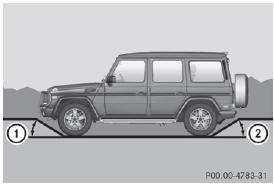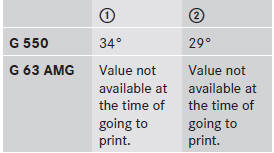Traveling uph
Approach/departure angle
WARNING If you drive on a steep incline at an angle or turn when driving on an incline, the vehicle could slip sideways, tip and rollover. There is a risk of an accident.
Always drive on a steep incline in the line of fall (straight up or down) and do not turn the vehicle.


R Observe the safety notes and the general notes on off-road driving.
Х Do not drive at an angle on slopes, inclines or gradients, but instead follow the direct line of fall. The maximum gradient-climbing capability of your vehicle is 80%, which corresponds to an approach/departure angle of 38∞. Note that the vehicle's gradient-climbing capability depends on the off-road conditions.
Х Before driving on extreme uphill and downhill gradients, shift the transfer case to LOW RANGE.
Х Engage the differential locks, if necessary .
Х Drive slowly.
Х Accelerate gently and make sure that the wheels are gripping.
Х Avoid high engine speeds, except when driving on sandy and muddy routes with high driving resistance.
Х Avoid high engine speeds Ц drive at an appropriate engine speed (maximum 3,000 rpm).
Х When driving down an incline, make use of the engine's braking effect. Observe the engine speed; do not overrev the engine.
Further information on the maximum engine speed: .
R Select a shift range appropriate to the gradient.
Х Before tackling steep downhill gradients, select shift range 1.
Х Always check the brakes after driving offroad.
Hill start assist will aid you when pulling away on a hill.
For more information, see "Hill start assist" .
Maximum gradient-climbing capability
On good road surfaces the maximum gradient-climbing capability of your vehicle is 80%, which corresponds to an approach/ departure angle of 38∞. Note that the vehicle's gradient-climbing capability depends on the off-road conditions.
Accelerate carefully and make sure that the wheels do not spin when driving on steep terrain.
If the load on the front axle is reduced when pulling away on a steep uphill slope, the front wheels have a tendency to spin.
4ETS detects this and brakes the wheels accordingly. The rear wheel torque is increased, making it easier to drive off.
Hilltops
When driving on an uphill gradient, reduce pressure slightly on the accelerator immediately before reaching the top of the hill (do not shift the transmission to position N).
Use the vehicle's own impetus to drive over the top of the hill.
This style of driving prevents:
Х the vehicle from lifting off the ground on the
brow of a hill
Х loss of traction
R the vehicle from traveling too quickly down
the other side
Driving downhill
R Before tackling steep downhill gradients, select shift range 1.
This way you use the engine's braking effect to reduce the speed. If this is not sufficient, brake gently. When doing so, make sure that the vehicle is facing in the direction of the line of fall.
Х Observe the notes on driving in mountainous terrain .
Х Drive slowly.
Х Do not drive at an angle down steep inclines. Steer into the line of fall and drive with the front wheels aligned straight.
Otherwise, the vehicle could slip sideways, tip and roll over.
Х Check that the brakes are working normally after a long downhill stretch.
The special off-road ABS setting enables repeated, brief, precise locking of the front wheels, which leads to the wheels digging into the loose ground. Note that when the front wheels are fully braked, they slide easily over the surface of the ground, making it difficult to steer.
See also:
Off-road driving systems
4MATIC (permanent four-wheel drive)
If you fail to adapt your driving style, 4MATIC
can neither reduce the risk of accident nor
override the laws of physics. 4MATIC cannot
take account of road, we ...
Useful information
This Operator's Manual describes all
models and all standard and optional
equipment of your vehicle available at the
time of publication of the Operator's
Manual. Country-specific differences are
...
Coolant
Important safety notes
WARNING
Antifreeze is highly flammable. Fire, open
flames and smoking are prohibited when
handling antifreeze.
If antifreeze comes into contact with hot
engine parts, it ...
